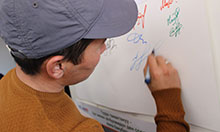A global and local problem
In the Kyrgyz Republic, 35 percent of women of reproductive age (15–49 years) suffer from some form of anemia. Anemia can be caused by a variety of factors, including iron deficiency, parasitic infections, and chronic inflammation. In the Kyrgyz Republic, iron deficiency causes most cases of anemia.1 Anemia has multiple symptoms— depending on its severity—including dizziness and fatigue, decreased cognitive development and productivity, and an increased risk of maternal and child mortality. Pregnant women are particularly vulnerable; taking iron–folic acid (IFA) supplements during pregnancy can reduce anemia and improve neonatal outcomes.2
A mother-in-law’s observations
I’m a mother of four children, and I only had a vague understanding that anemia is associated with blood. I never received any information about the consequences of anemia for mothers and children.
-Nurdana Korgoldoeva, mother, grandmother, and community volunteer
Nurdana Korgoldoeva lives in Tolok village of Kochkor rayon, Naryn oblast. This remote village has 390 households, including 45 households with children under the age of 2. In her many years, Nurdana has seen the negative effects from anemia for both women and children in her community, particularly malaise and tiredness. Nurdana’s youngest son was married in 2013 and her new daughter-in-law, Nurzat Azhibekova, initially found it difficult to adapt to life in the rural and remote village.
During Nurzat’s first pregnancy in 2014, she refused to take the IFA supplement prescribed by her local healthcare provider because of the side effects: nausea and vomiting. Nurzat delivered her baby prematurely, and struggled to breastfeed; she quickly changed over to formula.
When SPRING started working in Tolok village in 2016, Nurdana was intrigued by the project’s goal to improve nutrition and prevent anemia among women and children. She became a community volunteer for the project. In this role, she received trainings on various nutrition and hygiene topics, and then shared this information with her neighbors during household visits and community meetings.
Putting new knowledge into practice
While women are advised to take IFA during pregnancy, many do not take the supplements regularly because of the side effects, which can include constipation, nausea, vomiting, and a metallic taste in the mouth. SPRING worked to increase awareness about the seriousness of anemia and the prevention strategies through its work in both communities and facilities. The project trained health care providers on how to counsel pregnant women on taking IFA and how to mitigate any side effects. SPRING also worked with its cohort of volunteers to share information directly with community members on eating a variety of iron-rich products and eating them with foods rich in vitamin C to aid iron absorption.
When Nurzat became pregnant again, Nurdana knew how to help her daughter-in-law. Following the recommendations provided by her mother-in-law, Nurzat avoided drinking tea with her meals and took the IFA supplements regularly. She also tried to add more foods rich in iron to her diet, like leafy green vegetables and meat. In 2017, Nurzat gave a birth to her son, Amir, and exclusively breastfed him for the first six months. Now 18 months old, Amir is healthy and achieving his developmental milestones.
Tackling anemia systematically
From 2014 to 2018, SPRING worked to improve the nutrition of women of reproductive age and children under 2 years in Jalalabad and Naryn oblasts and the capital city of Bishkek. In 2015, SPRING supported the development and finalization of a clinical protocol and guidelines on the prevention and treatment of anemia, which now recommends providing IFA supplements to all pregnant women throughout their pregnancy and for three months after the delivery of their baby. The guidelines also recommend intermittent IFA supplementation for all women of reproductive age. Previously, doctors prescribed iron tablets to pregnant women only if diagnosed with anemia. SPRING trained more than 3,200 community volunteers and 1,700 health providers within its catchment area on how to prevent and treat anemia.
